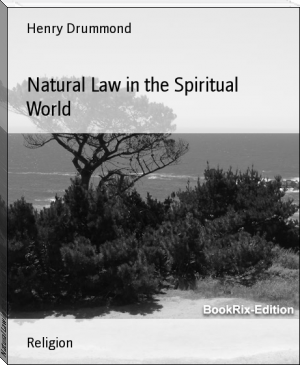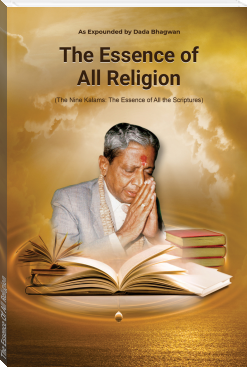Natural Law in the Spiritual World - Henry Drummond (feel good novels txt) 📗

- Author: Henry Drummond
Book online «Natural Law in the Spiritual World - Henry Drummond (feel good novels txt) 📗». Author Henry Drummond
with the latter. What Heredity has to do for us is determined outside ourselves. No man can select his own parents. But every man to some extent can choose his own Environment. His relation to it, however largely determined by Heredity in the first instance, is always open to alteration. And so great is his control over Environment and so radical its influence over him, that he can so direct it as either to undo, modify, perpetuate or intensify the earlier hereditary influence within certain limits. But the aspects of Environment which we have now to consider do not involve us in questions of such complexity. In what high and mystical sense, also, Heredity applies to the spiritual organism we need not just now inquire. In the simpler relations of the more external factor we shall find a large and fruitful field for study.
The influence of Environment may be investigated in two main aspects. First, one might discuss the modern and very interesting question as to the power of Environment to induce what is known to recent science as Variation. A change in the surroundings of any animal, it is now well-known, can so react upon it as to cause it to change. By the attempt, conscious or unconscious, to adjust itself to the new conditions, a true physiological change is gradually wrought within the organism. Hunter, for example, in a classical experiment, so changed the Environment of a sea-gull by keeping it in captivity that it could only secure a grain diet. The effect was to modify the stomach of the bird, normally adapted to a fish diet, until in time it came to resemble in structure the gizzard of an ordinary grain-feeder such as the pigeon. Holmgren again reversed this experiment by feeding pigeons for a lengthened period on a meat-diet, with the result that the gizzard became transformed into the carnivorous stomach. Mr. Alfred Russel Wallace mentions the case of a Brazilian parrot which changes its color from green to red or yellow when fed on the fat of certain fishes. Not only changes of food, however, but changes of climate and of temperature, changes in surrounding organisms, in the case of marine animals even changes of pressure, of ocean currents, of light, and of many other circumstances, are known to exert a powerful modifying influence upon living organisms. These relations are still being worked out in many directions, but the influence of Environment as a prime factor in Variation is now a recognized doctrine of science.[81]
Even the popular mind has been struck with the curious adaptation of nearly all animals to their _habitat_, for example in the matter of color. The sandy hue of the sole and flounder, the white of the polar bear with its suggestion of Arctic snows, the stripes of the Bengal tiger--as if the actual reeds of its native jungle had nature-printed themselves on its hide;--these, and a hundred others which will occur to every one, are marked instances of adaptation to Environment, induced by Natural Selection or otherwise, for the purpose, obviously in these cases at least, of protection.
To continue the investigation of the modifying action of Environment into the moral and spiritual spheres, would be to open a fascinating and suggestive inquiry. One might show how the moral man is acted upon and changed continuously by the influences, secret and open, of his surroundings, by the tone of society, by the company he keeps, by his occupation, by the books he reads, by Nature, by all, in short, that constitutes the habitual atmosphere of his thoughts and the little world of his daily choice. Or one might go deeper still and prove how the spiritual life also is modified from outside sources--its health or disease, its growth or decay, all its changes for better or for worse being determined by the varying and successive circumstances in which the religious habits are cultivated. But we must rather transfer our attention to a second aspect of Environment, not perhaps so fascinating but yet more important.
So much of the modern discussion of Environment revolves round the mere question of Variation that one is apt to overlook a previous question. Environment as a factor in life is not exhausted when we have realized its modifying influence. Its significance is scarcely touched. The great function of Environment is not to modify but to _sustain_. In sustaining life, it is true, it modifies. But the latter influence is incidental, the former essential. Our Environment is that in which we live and move and have our being. Without it we should neither live or move nor have any being. In the organism lies the principle of life; in the Environment are the conditions of life. Without the fulfillment of these conditions, which are wholly supplied by Environment, there can be no life. An organism in itself is but a part; Nature is its complement. Alone, cut off from its surroundings, it is not. Alone, cut off from my surroundings, I am not--physically I am not. I am, only as I am sustained. I continue only as I receive. My Environment may modify me, but it has first to keep me. And all the time its secret transforming power is indirectly moulding body and mind it is directly active in the more open task of ministering to my myriad wants and from hour to hour sustaining life itself.
To understand the sustaining influence of Environment in the animal world, one has only to recall what the biologist terms the extrinsic or subsidiary conditions of vitality. Every living thing normally requires for its development an Environment containing air, light, heat, and water. In addition to these, if vitality is to be prolonged for any length of time, and if it is to be accompanied with growth and the expenditure of energy, there must be a constant supply of food. When we simply remember how indispensable food is to growth and work, and when we further bear in mind that the food-supply is solely contributed by the Environment, we shall realize at once the meaning and the truth of the proposition that without Environment there can be no life. Seventy per cent. at least of the human body is made of pure water, the rest of gases and earth. These have all come from Environment. Through the secret pores of the skin two pounds of water are exhaled daily from every healthy adult. The supply is kept up by Environment. The Environment is really an unappropriated part of ourselves. Definite portions are continuously abstracted from it and added to the organism. And so long as the organism continues to grow, act, think, speak, work, or perform any other function demanding a supply of energy, there is a constant, simultaneous, and proportionate drain upon its surroundings.
This is a truth in the physical, and therefore in the spiritual, world of so great importance that we shall not mis-spend time if we follow it, for further confirmation, into another department of nature. Its significance in Biology is self-evident; let us appeal to Chemistry.
When a piece of coal is thrown on the fire, we say that it will radiate into the room a certain quantity of heat. This heat, in the popular conception, is supposed to reside in the coal and to be set free during the process of combustion. In reality, however, the heat energy is only in part contained in the coal. It is contained just as truly in the coal's Environment--that is to say, in the oxygen of the air. The atoms of carbon which compose the coal have a powerful affinity for the oxygen of the air. Whenever they are made to approach within a certain distance of one another, by the initial application of heat, they rush together with inconceivable velocity. The heat which appears at this moment, comes neither from the carbon alone, nor from the oxygen alone. These two substances are really inconsumable, and continue to exist, after they meet in a combined form, as carbonic acid gas. The heat is due to the energy developed by the chemical embrace, the precipitate rushing together of the molecules of carbon and the molecules of oxygen. It comes, therefore, partly from the coal and partly from the Environment. Coal alone never could produce heat, neither alone could Environment. The two are mutually dependent. And although in nearly all the arts we credit everything to the substance which we can weigh and handle, it is certain that in the most cases the larger debt is due to an invisible Environment.
This is one of those great commonplaces which slip out of general reckoning by reason of their very largeness and simplicity. How profound, nevertheless, are the issues which hang on this elementary truth, we shall discover immediately. Nothing in this age is more needed in every department of knowledge than the rejuvenescence of the commonplace. In the spiritual world especially, he will be wise who courts acquaintance with the most ordinary and transparent facts of Nature; and in laying the foundations for a religious life he will make no unworthy beginning who carries with him an impressive sense of so obvious a truth as that without Environment there can be no life.
For what does this amount to in the spiritual world? Is it not merely the scientific re-statement of the reiterated aphorism of Christ, "Without Me ye can do nothing?" There is in the spiritual organism a principle of life; but that is not self-existent. It requires a second factor, a something in which to live and move and have its being, an Environment. Without this it cannot live or move or have any being. Without Environment the soul is as the carbon without the oxygen, as the fish without the water, as the animal frame without the extrinsic conditions of vitality.
And what is the spiritual Environment? It is God. Without this, therefore, there is no life, no thought, no energy, nothing--"without Me ye can do nothing."
The cardinal error in the religious life is to attempt to live without an Environment. Spiritual experience occupies itself, not too much, but too exclusively, with one factor--the soul. We delight in dissecting this much tortured faculty, from time to time, in search of a certain something which we call our faith--forgetting that faith is but an attitude, an empty hand for grasping an environing Presence. And when we feel the need of a power by which to overcome the world, how often do we not seek to generate it within ourselves by some forced process, some fresh girding of the will, some strained activity which only leaves the soul in further exhaustion? To examine ourselves is good; but useless unless we also examine Environment. To bewail our weakness is right, but not remedial. The cause must be investigated as well as the result. And yet, because we never see the other half of the problem, our failures even fail to instruct us. After each new collapse we begin our life anew, but on the old conditions; and the attempt ends as usual in the repetition--in the circumstances the inevitable repetition--of the old disaster. Not that at times we do not obtain glimpses of the true state of the case. After seasons of much discouragement, with the sore sense upon us of our abject feebleness, we do confer with ourselves, insisting for the thousandth time, "My soul, wait thou only upon God." But the lesson is soon forgotten. The strength supplied we speedily credit to our own achievement; and even the temporary success is mistaken for a symptom of improved inward vitality. Once more we become self-existent. Once more we go on living without an Environment. And once more, after days of wasting without repairing, of spending without replenishing, we begin to perish with hunger, only returning to God again, as a last resort,
The influence of Environment may be investigated in two main aspects. First, one might discuss the modern and very interesting question as to the power of Environment to induce what is known to recent science as Variation. A change in the surroundings of any animal, it is now well-known, can so react upon it as to cause it to change. By the attempt, conscious or unconscious, to adjust itself to the new conditions, a true physiological change is gradually wrought within the organism. Hunter, for example, in a classical experiment, so changed the Environment of a sea-gull by keeping it in captivity that it could only secure a grain diet. The effect was to modify the stomach of the bird, normally adapted to a fish diet, until in time it came to resemble in structure the gizzard of an ordinary grain-feeder such as the pigeon. Holmgren again reversed this experiment by feeding pigeons for a lengthened period on a meat-diet, with the result that the gizzard became transformed into the carnivorous stomach. Mr. Alfred Russel Wallace mentions the case of a Brazilian parrot which changes its color from green to red or yellow when fed on the fat of certain fishes. Not only changes of food, however, but changes of climate and of temperature, changes in surrounding organisms, in the case of marine animals even changes of pressure, of ocean currents, of light, and of many other circumstances, are known to exert a powerful modifying influence upon living organisms. These relations are still being worked out in many directions, but the influence of Environment as a prime factor in Variation is now a recognized doctrine of science.[81]
Even the popular mind has been struck with the curious adaptation of nearly all animals to their _habitat_, for example in the matter of color. The sandy hue of the sole and flounder, the white of the polar bear with its suggestion of Arctic snows, the stripes of the Bengal tiger--as if the actual reeds of its native jungle had nature-printed themselves on its hide;--these, and a hundred others which will occur to every one, are marked instances of adaptation to Environment, induced by Natural Selection or otherwise, for the purpose, obviously in these cases at least, of protection.
To continue the investigation of the modifying action of Environment into the moral and spiritual spheres, would be to open a fascinating and suggestive inquiry. One might show how the moral man is acted upon and changed continuously by the influences, secret and open, of his surroundings, by the tone of society, by the company he keeps, by his occupation, by the books he reads, by Nature, by all, in short, that constitutes the habitual atmosphere of his thoughts and the little world of his daily choice. Or one might go deeper still and prove how the spiritual life also is modified from outside sources--its health or disease, its growth or decay, all its changes for better or for worse being determined by the varying and successive circumstances in which the religious habits are cultivated. But we must rather transfer our attention to a second aspect of Environment, not perhaps so fascinating but yet more important.
So much of the modern discussion of Environment revolves round the mere question of Variation that one is apt to overlook a previous question. Environment as a factor in life is not exhausted when we have realized its modifying influence. Its significance is scarcely touched. The great function of Environment is not to modify but to _sustain_. In sustaining life, it is true, it modifies. But the latter influence is incidental, the former essential. Our Environment is that in which we live and move and have our being. Without it we should neither live or move nor have any being. In the organism lies the principle of life; in the Environment are the conditions of life. Without the fulfillment of these conditions, which are wholly supplied by Environment, there can be no life. An organism in itself is but a part; Nature is its complement. Alone, cut off from its surroundings, it is not. Alone, cut off from my surroundings, I am not--physically I am not. I am, only as I am sustained. I continue only as I receive. My Environment may modify me, but it has first to keep me. And all the time its secret transforming power is indirectly moulding body and mind it is directly active in the more open task of ministering to my myriad wants and from hour to hour sustaining life itself.
To understand the sustaining influence of Environment in the animal world, one has only to recall what the biologist terms the extrinsic or subsidiary conditions of vitality. Every living thing normally requires for its development an Environment containing air, light, heat, and water. In addition to these, if vitality is to be prolonged for any length of time, and if it is to be accompanied with growth and the expenditure of energy, there must be a constant supply of food. When we simply remember how indispensable food is to growth and work, and when we further bear in mind that the food-supply is solely contributed by the Environment, we shall realize at once the meaning and the truth of the proposition that without Environment there can be no life. Seventy per cent. at least of the human body is made of pure water, the rest of gases and earth. These have all come from Environment. Through the secret pores of the skin two pounds of water are exhaled daily from every healthy adult. The supply is kept up by Environment. The Environment is really an unappropriated part of ourselves. Definite portions are continuously abstracted from it and added to the organism. And so long as the organism continues to grow, act, think, speak, work, or perform any other function demanding a supply of energy, there is a constant, simultaneous, and proportionate drain upon its surroundings.
This is a truth in the physical, and therefore in the spiritual, world of so great importance that we shall not mis-spend time if we follow it, for further confirmation, into another department of nature. Its significance in Biology is self-evident; let us appeal to Chemistry.
When a piece of coal is thrown on the fire, we say that it will radiate into the room a certain quantity of heat. This heat, in the popular conception, is supposed to reside in the coal and to be set free during the process of combustion. In reality, however, the heat energy is only in part contained in the coal. It is contained just as truly in the coal's Environment--that is to say, in the oxygen of the air. The atoms of carbon which compose the coal have a powerful affinity for the oxygen of the air. Whenever they are made to approach within a certain distance of one another, by the initial application of heat, they rush together with inconceivable velocity. The heat which appears at this moment, comes neither from the carbon alone, nor from the oxygen alone. These two substances are really inconsumable, and continue to exist, after they meet in a combined form, as carbonic acid gas. The heat is due to the energy developed by the chemical embrace, the precipitate rushing together of the molecules of carbon and the molecules of oxygen. It comes, therefore, partly from the coal and partly from the Environment. Coal alone never could produce heat, neither alone could Environment. The two are mutually dependent. And although in nearly all the arts we credit everything to the substance which we can weigh and handle, it is certain that in the most cases the larger debt is due to an invisible Environment.
This is one of those great commonplaces which slip out of general reckoning by reason of their very largeness and simplicity. How profound, nevertheless, are the issues which hang on this elementary truth, we shall discover immediately. Nothing in this age is more needed in every department of knowledge than the rejuvenescence of the commonplace. In the spiritual world especially, he will be wise who courts acquaintance with the most ordinary and transparent facts of Nature; and in laying the foundations for a religious life he will make no unworthy beginning who carries with him an impressive sense of so obvious a truth as that without Environment there can be no life.
For what does this amount to in the spiritual world? Is it not merely the scientific re-statement of the reiterated aphorism of Christ, "Without Me ye can do nothing?" There is in the spiritual organism a principle of life; but that is not self-existent. It requires a second factor, a something in which to live and move and have its being, an Environment. Without this it cannot live or move or have any being. Without Environment the soul is as the carbon without the oxygen, as the fish without the water, as the animal frame without the extrinsic conditions of vitality.
And what is the spiritual Environment? It is God. Without this, therefore, there is no life, no thought, no energy, nothing--"without Me ye can do nothing."
The cardinal error in the religious life is to attempt to live without an Environment. Spiritual experience occupies itself, not too much, but too exclusively, with one factor--the soul. We delight in dissecting this much tortured faculty, from time to time, in search of a certain something which we call our faith--forgetting that faith is but an attitude, an empty hand for grasping an environing Presence. And when we feel the need of a power by which to overcome the world, how often do we not seek to generate it within ourselves by some forced process, some fresh girding of the will, some strained activity which only leaves the soul in further exhaustion? To examine ourselves is good; but useless unless we also examine Environment. To bewail our weakness is right, but not remedial. The cause must be investigated as well as the result. And yet, because we never see the other half of the problem, our failures even fail to instruct us. After each new collapse we begin our life anew, but on the old conditions; and the attempt ends as usual in the repetition--in the circumstances the inevitable repetition--of the old disaster. Not that at times we do not obtain glimpses of the true state of the case. After seasons of much discouragement, with the sore sense upon us of our abject feebleness, we do confer with ourselves, insisting for the thousandth time, "My soul, wait thou only upon God." But the lesson is soon forgotten. The strength supplied we speedily credit to our own achievement; and even the temporary success is mistaken for a symptom of improved inward vitality. Once more we become self-existent. Once more we go on living without an Environment. And once more, after days of wasting without repairing, of spending without replenishing, we begin to perish with hunger, only returning to God again, as a last resort,
Free e-book «Natural Law in the Spiritual World - Henry Drummond (feel good novels txt) 📗» - read online now
Similar e-books:





Comments (0)